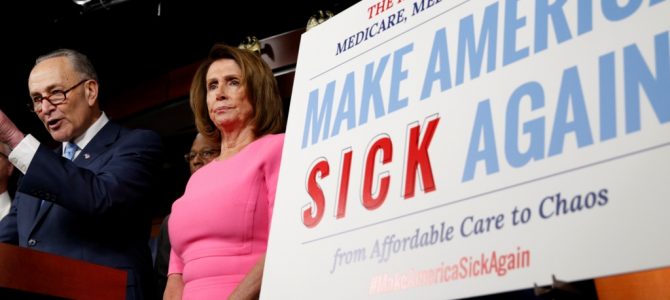
So #MakeAmericaSickAgain is the slogan Democrats cooked up to oppose Republican health-care reform efforts. That’s because, as you may recall, before 2010 America’s streets were strewn with the bodies of the neglected and dead.
Since Democrats are focusing their campaign on the myth that Obamacare is working for most Americans, it’s imperative they create the impression no viable alternative exists. After all, it’s been nearly a week since the new congressional session started, and Republicans still haven’t produced a comprehensive plan to replace a massive federal health-care law.
In which I unload both barrels at the Trump & Republican “plan” to replace Obamacare. Here’s why: people will die. https://t.co/dqvh6zemd7 pic.twitter.com/fvuMomuxxH
— Nicholas Kristof (@NickKristof) January 5, 2017
The New York Times’ Nicholas Kristof leaves a blank paragraph in his column to illustrate what a Republican “plan” to replace Obamacare will look like, before indulging in the customary “people will die!” scaremongering. (Kristof’s newspaper, by the way, featured a piece headlined “Republicans’ 4-step plan to repeal the Affordable Care Act” the same day his column ran.)
Now, if by “plan,” Kristof is using the contemporary Left’s definition, meaning a expensive, constricting federal regulatory scheme that forces Americans to participate through a series of mandates, then one hopes Republicans never have a “plan.” If the word “plan” still means “a proposal for doing or achieving something,” the GOP have many.
Although there may not be space in either of Kristof’s truth barrels to mention this proposal put forward by the speaker of the House, or the numerous other conservative plans that have been floated, they do exist even if he doesn’t approve. Figuring out a way to turn them into legislation that can pass both houses and meet the approval of a new populist president (who, by the way, isn’t even in office yet) will probably take more than a couple of weeks.
You can have plans. And they can change. I know this because Democrats had many big plans in 2008 but they did not have a finished bill ready to go on day one. This, even though they’d been talking, campaigning, and promising to reform the health-care system for decades. When running for president, Barack Obama (supposedly) opposed the idea of an individual mandate — the device on which Obamacare’s rickety viability hinges — yet it was only later part of the plan. While he was changing his mind, the Senate Finance Committee held 31 meetings to develop Obamacare specifics.
Democrats also had to drop the “public” option and rejigger their abortion coverage to make the bill politically palatable for the moderates in their own party — not the GOP. Even after this the Democrats, who passed the basic structure of Obamacare without having to worry about any Republican opposition, were only later forced to use reconciliation to make it acceptable for the House.
Perhaps Republicans are embracing a newfound competence by avoiding those political pitfalls. Perhaps they’re looking for consensus on timelines and specifics that will make it more feasible. Most likely, it’s going to be messy again. It’s not unprecedented.
Watching Republicans trying to grapple with the reality of ACA repeal is both entertaining and deeply dispiriting. 1/
— Paul Krugman (@paulkrugman) January 5, 2017
Of course politicians grapple with the reality of power. Democrats have grappled with the failure of their policy promises for six years. Krugman, like everyone else perpetuating the myth that there are no replacement plans, act as if coverage can only exist through fake state-run exchanges or welfare.
Don’t worry, though; today’s “they have no plan!” is tomorrow’s “that plan is extremist!”
It is worth reiterating that the replacement plan doesn’t have to be conceptually or functionally similar to Obamacare, no matter how often the Paul Krugmans of the world demand it. The comprehensiveness and rigidity of Obamacare are things to avoid. So replacement plans can be passed piecemeal.
For instance, the GOP can start by overturning the “nondiscrimination rule” that assaults religious freedom. They can get rid of the individual mandate. They can cut funding to abortion mills. They can deregulate to bring down costs and grant waivers that allow states to innovate in ways previously closed to them. Democrats demanded change overnight. The GOP doesn’t have to do the same.
In the end, though, Republicans will have to sell the American people on market-based solutions. They will have to contrast that vision with the top-down economics adopted by the Left. They will likely adopt some of the more popular aspects of Obamacare (ones they’ve consistently supported) like coverage for preexisting conditions. I’m not sure how they plan to pay for it without a mandate (maybe Republicans can raid Medicare like Democrats did to offset the costs?), but if the tradeoff is deregulation of Obamacare’s most intrusive components, it would be worthwhile in the long run.
They will also deal with the difficult political task of reforming a massive expansion of Medicaid (the vast majority of Obamacare’s “newly insured” are actually new welfare recipients). They will have to answer Kristof’s claims that “millions of Americans will lose insurance, and thousands more will die unnecessarily each year because of lack of care.” Republicans will have to convince voters that opening up affordable and competitive markets without coercion is preferable to preserving unsustainable state-run programs that grow in perpetuity.
Whatever the resulting plan looks like, though, from here on in Republicans own health care. And if the GOP fails to repeal Obamacare, it will be a function of incompetence and spinelessness, not a lack of ideas.









